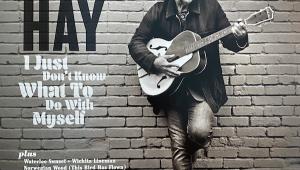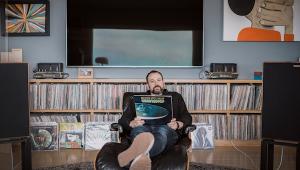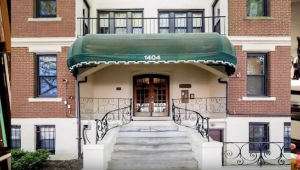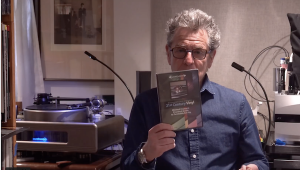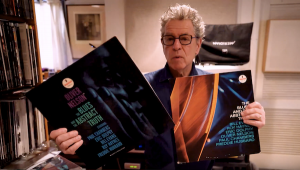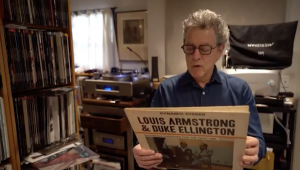Mike Peters on the Eternal Love, Hope, and Strength of Listening to The Alarm on Vinyl

We lost a true hero the other day. Mike Peters, frontman of the iconoclast Welsh alt-rockers The Alarm, passed away at age 66 on April 29, 2025, in Dyserth, Wales, following a three-decades-long battle with cancer.
There are many brave souls who have fought cancer and won, and Mike was a fighter in everything he did. He f---ed cancer up as many times as it f---ing attacked him, and I’m still deeply saddened by his passing. Mike was always generous with his time, spirit, and energy every time we spoke and/or saw each other in person over the years, so, to honor his legacy, I dug out our unpublished interview from last year that I’ll share with you all in the here and now. Plus, I retrieved the following 9-minute video interview Mike and I shot together back in 2016, which is available for viewing below, and on the AP YouTube page. (Yes, it’s a bit dark, but we were ensconced in a low-lit backstage bungalow, so we had to make due!)
Before I get to the unpublished Q&A, here’s something Mike said to me on the phone a few years back on September 10, 2019, after I told him, “I feel like you’re the Welsh Woody Guthrie — your guitar should be killing fascists out there, or something. Do you feel that, to some degree?” Mike laughed, then he said, “That’s an honorable thing to aspire to be! Woody Guthrie was never prone to fascists. He wrote songs he believed in, songs that he could sing in his voice — and that’s all I’m doing. I’m never in it to have a hit, or anything like that. I always wanted to have a life in music.”
He continued, “The first part of my life had some myths, and I become less mysterious as I get older. I’ve been able to expand on certain things and develop certain ideas that you don’t get to when you’re young. You lay the first foundation stones, but you don’t see the house until the roof goes on. I think we’re at the point now where we’re putting the roof on, and we’re starting to make more sense of the subdivision that was laid out at the beginning. People can relate to it a little bit more, and understand it more for what it actually is.”
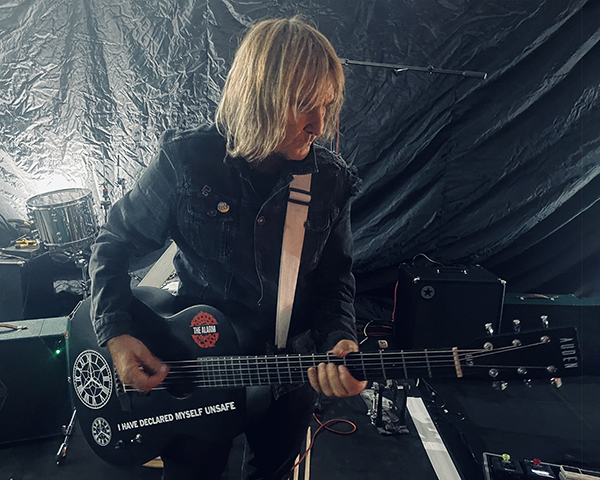
Our most recent, final interview had been postponed a few times due to Mike’s ongoing health battles. It was initially set for August 2023, then moved to September 2023 after I received the following note: “Mike was in treatment for the past few weeks, but he is back and says he is totally up for a conversation with you!” — but then we had to push pause again. Health comes first, so I hoped Mike would conquer the latest iteration of his cancer foe.
When the calendar turned to early March 2024, Mike’s team again reached out and asked if I wanted to revisit doing the interview. Naturally, I did, so Mike and I soon enough had a great hour-long conversation on Zoom to his home studio/locale in Wales on March 13, 2024, with the hope that we’d do it again in the future. Six weeks after that interview took place, the cancer had returned. In an open letter/personal message to his fans that was dated April 29, 2024 — ironically, exactly one year to the day before his passing — Mike wrote, “Cancer has been chasing me for 29 years now, and in all that time, I have managed to outrun the disease and stay alive. My focus and resolve remain the same, and I’m determined to keep running even harder to stay one step ahead and resume my life as a husband, father, and musician as soon as possible.” Six months later, on October 25, 2024, Mike updated us on his ongoing battle with Richter’s Syndrome. “29 years ago today on October 25th 1995, I first heard the words ‘Cancer and Mike Peters’ in the same sentence,” he observed. Honestly, I never thought anything could stop him.
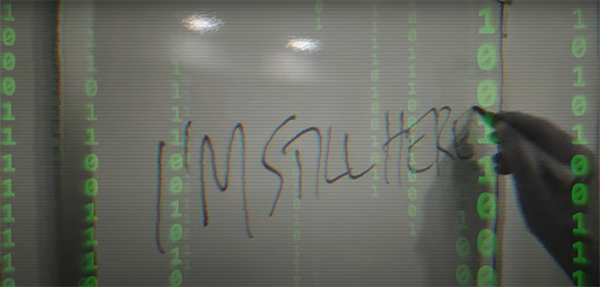
Throughout it all, Mike remained ever-positive, and he would alternate signing off his open letters and personal interactions with variations on heartfelt messages like “Love and life” and “Love Hope and Strength.” By Mike’s side the entire way was his unwavering wife and life partner, Jules Peters, who herself remains strength personified. I continue to admire her resolve.
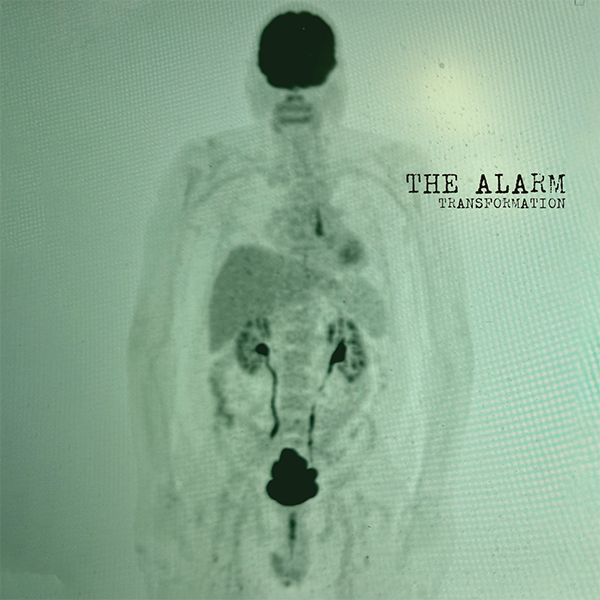
After those missives of his, I held off posting our interview out of deference to his struggles, but I had been thinking of timing the story to coincide with the upcoming June 6, 2025, release of the new Alarm album Transformation, which is being made available via Peters’ own Twenty First Century Recording Company imprint in multiple limited-edition forms — 250 copies of the 2LP audiophile vinyl edition with book (which I’ve happily preordered), and 350 copies each in 1LP form on both gold vinyl and silver vinyl, all of them available only at The Alarm Store via this link.
But, well, here we are now, and here’s the story. It was bittersweet revisiting such a lively, vinyl-centric discussion, but I hope you find what follows as rewarding as I did both at the time it happened, and in relistening to and transcribing it. In the interview that follows, Mike Peters and I discuss his favorite record shops he went to while growing up in Wales, the importance of understanding sleeve notes, and why early Alarm records were quieter on vinyl than they should have been. Who will light the fire / I need to survive. . .
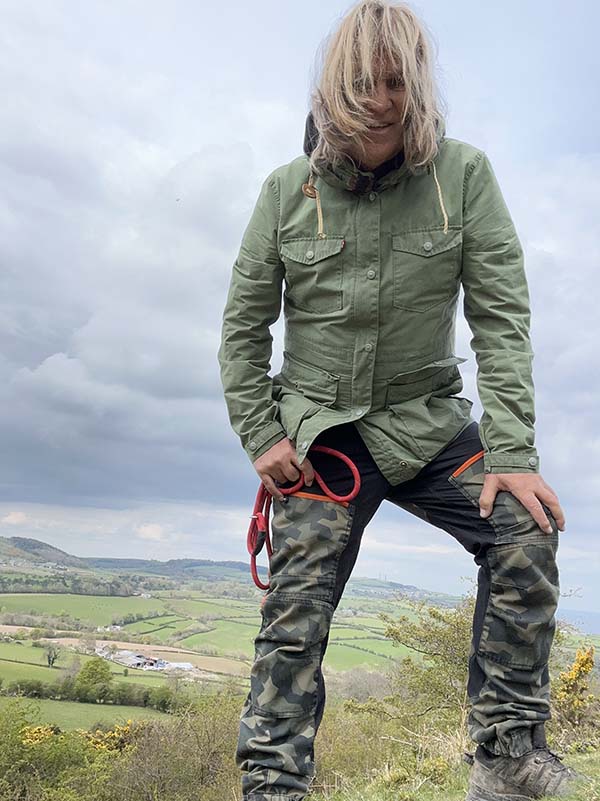
Mike Mettler: We’ve spoken about your passion for vinyl before, of course, because you’re very hands-on when it comes to the entire process. So, if you don’t mind, tell me again why it’s important for your music to be released on vinyl.
Mike Peters: Well, I’m a vinyl aficionado. That’s how I got into music — buying singles and LPs. That’s always been my preferred way of listening to music. Obviously, when I went on the road in the ’80s, we had to listen to cassettes. That’s all we had on the tour bus, so it was hard to play vinyl. But when I was on the road, I’d go into radio stations, and I’d ask them if there’s any new bands I should know about. I’d always ask for the vinyl editions, and then I’d take them home with me! (laughs) When I got home, it was the vinyl that I listened to.
Even when CDs kind of took over, I never got rid of my collection. But I had to sacrifice a lot of my records in the very early ’80s when we moved to London. We needed money for guitar strings, and we couldn’t afford them. So it was like, “Oh no, I’ve got to sell my copy of ‘Anarchy in the U.K.’!”
Mettler: I’ll second that “Oh no!” (both laugh) Wasn’t that the first record you bought? [“Anarchy in the U.K.,” of course, was Sex Pistols’ infamous November 1976 debut single on EMI.]
Peters: No, the first record, or the first album, I bought was Slade Alive! [released on Polydor in March 1972]. Well, I went to buy Slade Alive! — but I didn’t, because I didn’t understand the songwriting credits on the back of the sleeve. I thought the names after the titles were the artists who were singing them. “I don’t want a song with ‘Steppenwolf’ on it. Who’s he?” (both laugh) [Peters is referring to Slade’s live cover of “Born to Be Wild,” the last song on Side B.] There were only a couple of songs that had Slade on the credit, so I bought David Bowie’s Aladdin Sane instead [released on RCA Victor in April 1973].
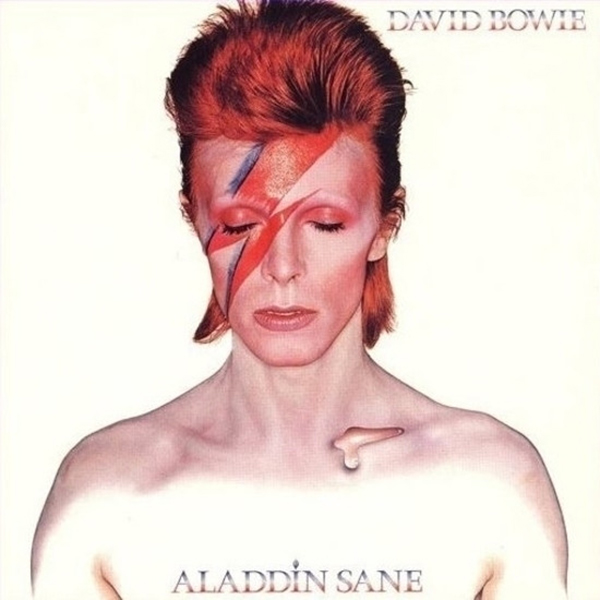
Mettler: Well, that’s not a bad alternate choice, Mike.
Peters: No. I knew “Drive-In Saturday” [Side 1, Track 3] off the radio. I loved that song, so I bought that album. And it was only when I got home and read the credits properly I saw there was a song that I knew was by The Rolling Stones, “Let’s Spend the Night Together” [on Side 2, Track 3]. That’s when I realized what a cover version was, because when you go buy your first single or first album, you don’t know what a cover version is. You think, “The singer’s written it, and made it!” That’s your natural assumption, when you’re a kid.
A lot of people don’t read the sleeve notes or don’t dig deep and look at the lyrics and what the credits say. They go through their whole life thinking the singer’s written the song. He’s sung it, he’s recorded it, no one’s had anything else to do with it — and it only took him three minutes to make it! (more laughter)
Mettler: So, I’m just curious — what was the record shop you went to as a kid growing up in Wales? Did you have one shop that was your favorite place to go to, to buy records?
Peters: There were a couple, but the main one I used to go to as a kid was called Greaves Records. It was in Rhyl. And then there was another one — it was a bit of a funky, hippie sort of shop called Electrip Records, and that was on the seafront [in Clwyd]. That place was cool. And then there was the Woolworth’s superstore of the town, and they sold records as well. I got into music a little bit because I got a job when I was 14 at Woolworth’s, and they had a record bar. While I was working at night, they let me put records on, and I used to love that.
Mettler: Nice. Did you get a discount to buy any of those records if you wanted to?
Peters: (chuckles) Not really, no! It was nice because you could play the records, and they taught you how to handle them properly because, back in those days, customers like me would go into the record shops and say (adopts nasally, adolescent vocal tone), “Can I hear this record?”
I was not a fan of Led Zeppelin for years, because I’d heard about and read about this demonic heavy metal band that were like the heaviest band in the world. I plucked up the courage to go into Greaves Records one day and ask the guy, (whispers), “Could you play Led Zeppelin?” And I’m thinking, “The devil is going to come out of the walls — dun dun dun — he’s asked for Led Zeppelin!” (MM laughs) Instead, he put on this polite acoustic guitar track. And then something like flutes came on, and I was thinking, “Uhh, that’s horrible!” He took it off before the drums came in. So, I always thought Led Zeppelin were a folky sort of horrible band for years. [That song was, of course, “Stairway to Heaven, from November 1971’s Led Zeppelin IV, a.k.a. Zoso, on Atlantic.] But when I went to America, I heard “Whole Lotta Love” [from October 1969’s Led Zeppelin II, also on Atlantic] on the radio, and then I thought, “Ah hah!” (smiles)
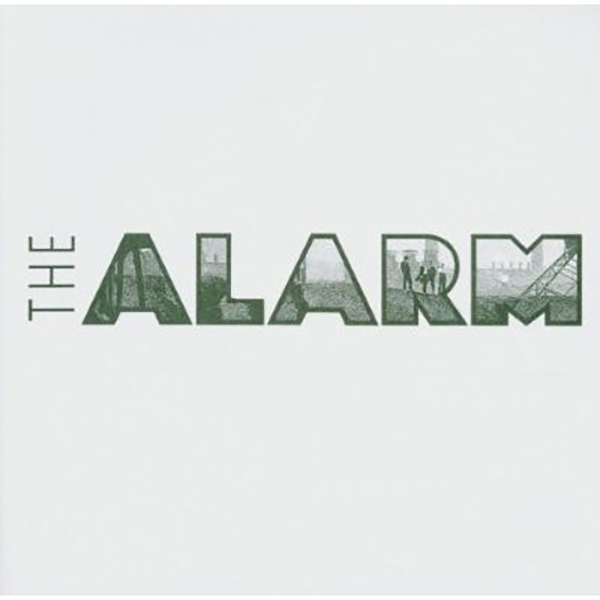
Mettler: Gotta love the Zep! Well, you know I like looking at those album credits too, and seeing names like, say, Tony Visconti as the producer on some of those other Bowie records we both love that came out before and after Aladdin Sane. And then we’d try to find out what other records he produced for other artists.
Peters: Talking about Tony Visconti, we recorded our 1989 album Change with him [released that September, on IRS Records]. And before that, we actually met John Paul Jones from Led Zeppelin. He came up to stay in my house here, with Dave [Sharp, The Alarm’s guitarist]. I actually took him to the local pub, The King’s Head, for a pint on the way back from rehearsals. They played “Stairway to Heaven” while we were in the bar (laughs hysterically) — and nobody knew who he was!
Mettler: That’s because they didn’t know what he looked like!
Peters: (continues laughing) That’s right! They didn’t. That happens all the time, Mike. But I’ve always been a scholar of music and the credits — and that doesn’t stop with me own band, you know? I’ve also always liked meeting younger bands from the next generation, and hearing things from them that are maybe a bit unexpected. It makes me think about what other directions we could have taken with The Alarm back then — but we’ll never know now, will we? I’m always looking back and thinking, “How did we end up here?” It’s all part of a process.

Mettler: And it’s always an ongoing process, right? But we can at least look back at where you came from and think about, say, how things started with your debut album Declaration, and the 40 years since it came out [in February 1984, on IRS]. Now that I’ve said it, you’re probably sitting back thinking, “How did that happen?” (Peters laughs, then holds up the album cover, as seen above) Ah, there it is! I also love the Declaration artwork that goes with it — it’s such a beautiful cover.
Peters: Yeah, yeah, it’s really nice. And we’ve just done a 40th anniversary of Declaration that’s an alternative edition of the album. I actually paint-sprayed all the covers for 250 limited-edition copies. You can’t hand-paint 25,000 copies, or I wouldn’t be here at the end of the process! (laughs again) It’s going to be very rare. It’s on white vinyl, and it’s numbered. We do those things from time to time. I think it’s nice.
[MM adds: [Alternative] Declaration sold out almost immediately upon its 2024 release, and no copies of it are available on The Alarm’s official site or on Discogs as of this posting. According to Popsike, one of the Peters-painted 2LP sets sold on eBay for $268 U.S. in March 2024.]
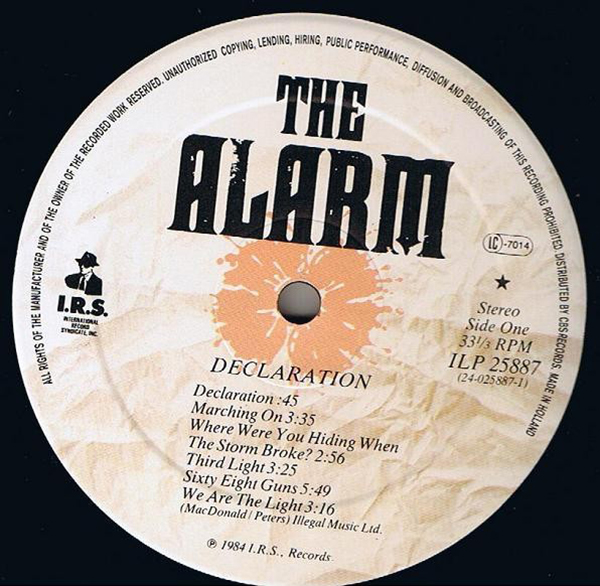
Peters: When we were making Declaration, I didn’t realize how long one of the sides was. It had “Sixty Eight Guns” on it [Side One, Track 5]. It was quite long, and I was thinking, “Wow.” When we came to America and people were playing albums, I thought, “Why does our record sound a bit quieter than everybody else’s?”
I realized that we’d made our album quite long. The only way to get it all on side was to cut it quieter, and the songs ran tighter together to fit it all in. And then you realize that has a big dynamic in how your record sounds when it gets into people’s homes and on the radio. That led to us all being a bit more obsessed about going to the cuts [i.e., the cutting/mastering sessions], and getting them louder.
When we were making those records — and I’ll say “we,” because we were in that same ’70s, ’80s era when there was no alternative — it was just cassettes or records, really, and no one thought about cassette too much. But even the Declaration cassette came with a different running order so it could balance out the two sides. When we got to Change in ’89, that was the first album we made when we knew CD was a serious format. We thought, “We can easily go over 40 minutes now. We can go up to 60!” And a lot of other artists did that too. [Change is 59 minutes long on CD, but two songs had to be cut from the running order to fit it onto 1LP.]
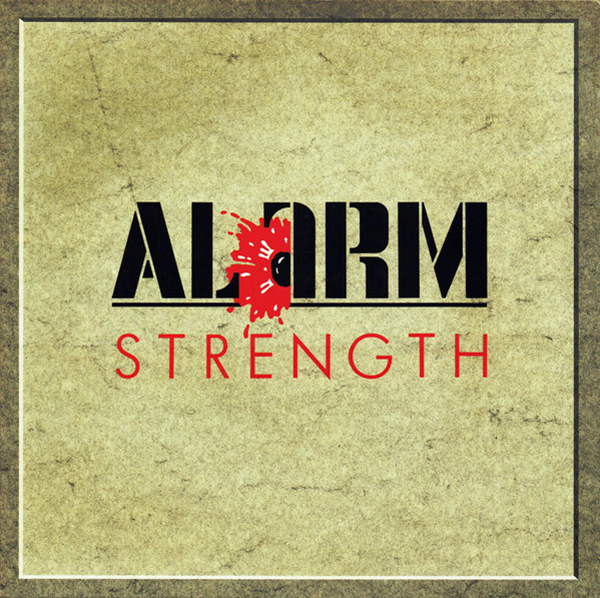
Mettler: Some album got way too long around that time — but that’s another story entirely! Anyway, I had my original Strength LP on earlier, I think the very first line of the chorus of the very first song on Side 1 is, “I’m living on a knifedge.” That album came out in, what, 1985, so it’s almost a 40-year difference. [Strength was released in October 1985 on IRS, and that first song is indeed titled “Knifedge.”] Does a line like that mean something different to you now than in the original context of the song? I kind of ascribe it to how you’re dealing with what’s happening with you today. It’s kind of prescient in a way, I suppose, but do you approach it differently now?
Peters: Yeah, absolutely. People say, “How do you go back to sing those old songs, so long after?” One of our signature songs is “Sixty Eight Guns” [Side 1, Track 5 on Declaration] — and it’s a battle cry! That’s how it was always seen when The Alarm burst onto the scene. But now, I emphasize the other lyrics in the chorus. “Sixty eight guns will never die.” That changes the emphasis on it. That switches the song from then to now.
And it’s the same with “Knifedge.” At the time, I was trying to sing about somebody who was living on the knifedge of not knowing if they were going to have a job coming up, or how to feed their family from one minute to the next in those hard recessional times in the ’80s — and we’re still living through them now. You know, at various points in your life, you find yourself on a knifedge. Whether you like it or not, you have to go there — and it’s the same in life. The songs grow with you. They don’t all stay the same, unless you tell a story about something absolutely specific.
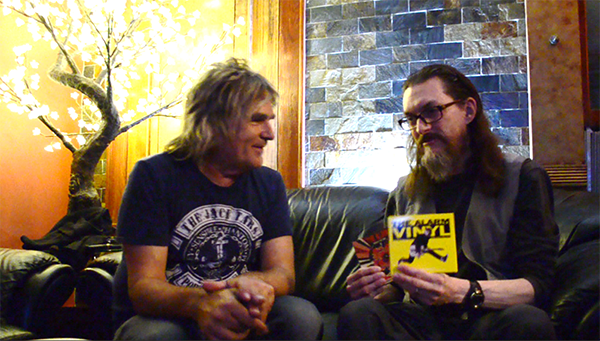
Mettler: Well, we could go on, but I want to get absolutely specific about wrapping things up. So, what I like to do with folks is, I’m going to throw us 50 years into the future now — and, as I like to say, unless some weird science is going on, maybe you and I are not physically on the planet then. Although you probably will be, Mike, because you’re going to be here forever, and. . .
Peters: (laughs) Hah hah — who knows!
Mettler: Well, you’re going to be here forever, and the rest of us won’t. But anyway, however people listen to music in that time, and they type in either “Mike Peters” or “The Alarm” into their listening device, what type of experience do you want that future listener to get?
Peters: Wow! Yeah, wow. That’s a big question, to ask that. I’d probably point them to the History Repeating [4LP] box set, or the double album that also came out with that title [both in 2021, via The Twenty First Century Recording Company]. I think that’s the purpose of a best-of, or a compilation. It’s for future listeners. I think that’s the thing you do.
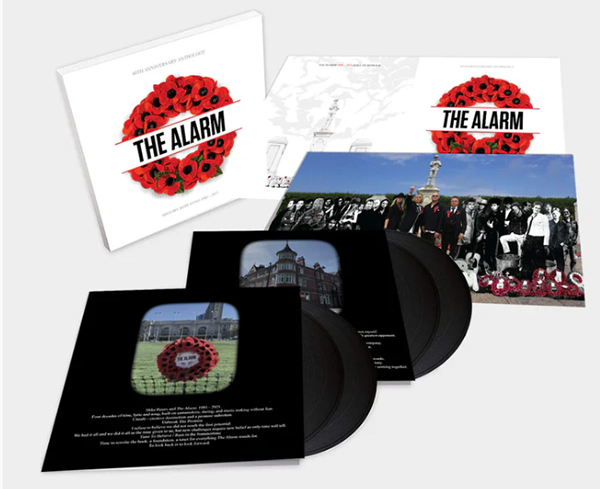
Peters: When I’m putting together those anniversary releases like History Repeating, it was for 40 years. We put all the best singles on the double vinyl LP, but then we use the box set to tell the story of The Alarm — a more alternative history of the band. I think if you got those two releases and play them in 2074, or 2075, you’ll get a pretty good idea of what the timeline of The Alarm was like.
We’re lucky enough to be of the era where it all began, and who knows how people are going to perceive it in 20 years, or 50. It’s going to be interesting, Mike. I wish I could come back in time to see it! Maybe we will be able to, by then.


